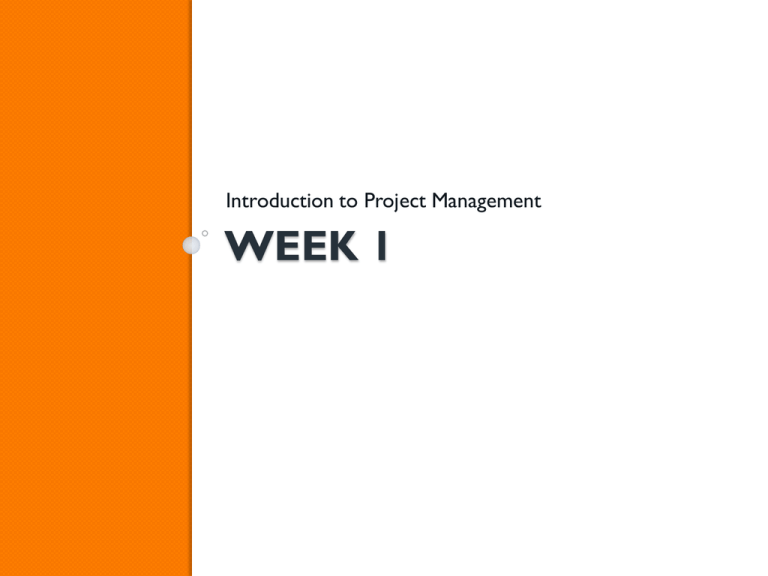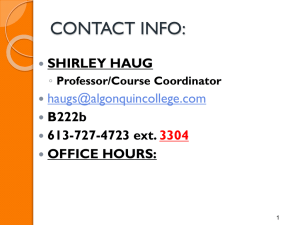Week 1 - Algonquin College
advertisement

Introduction to Project Management WEEK 1 Agenda Introduction to BUS2303 Introduction to Project Management ◦ ◦ ◦ ◦ Project Definition Project Management Definition Project Manger Project Management Life Cycle INTRODUCING BUS2303 Course Overview & Housekeeping Introductions / Ice Breaker Class Rules ◦ ◦ ◦ ◦ ◦ Cellphones Facebook Start and end of class times Attendance Email (refer to blackboard) Course Description & Methods Broken down into 2 modules: ◦ Project Management ◦ Databases. Each module contains ◦ Assignments, ◦ Hybrid activities and homework. ◦ A test. There is no midterm or final exam. Each Class You Can Expect Lecture. ◦ Note: PowerPoint slides available through the 14 Week Schedule Students are to take notes in preparation for end of class quiz Resources eText (Title: BUS2303 – Microsoft Project 2010, Author: Microsoft Office Academic Course, ISBN: 9781119925088 $26.00) Slides Online Videos Document Templates Dreamspark (ability to download MS Project) Course Structure & Schedule Information found in Blackboard ◦ Course Outline document Weeks 1 – 7 Project Management theory in class Microsoft Project application in your hybrid time. Week 8 Project Management Test Weeks 9 – 13 Database design Microsoft Access application Week 14 Database Theory and MS Access Test Evaluation Participation 12% Weekly quizzes Hybrid work Assignments 38% Project Management Internet Research WBS DB Design, Forms & Queries Tests 50% Project 30% Access 20% Scope of Learning This course will: ◦ Teach fundamentals, tools, and concepts of project planning, analysis, and control. ◦ Discuss the role of the project manager as well as team members in managing a project ◦ Practice fundamentals of project management Scope of Learning The course will not: ◦ Provide sufficient training for certification PROJECT MANAGEMENT INTRODUCTION What is Project Management? Project Management, according to PMI, is the application of knowledge, skills, tools and techniques to project activities to meet project requirements. Who Is PMI? Project Management Institute. Professional organization that governs the Project Management Industry. Author of PMBOK. Established professional certification. Definition of a Project According to PMI – it is a temporary endeavor undertaken to create a unique product, service or result In other words: ◦ Is Goal Specific – established objective ◦ Has a start and end date ◦ Has money, time and other resources Characteristics of a Project Has a definite start and end date Has resources: (can be money or people etc) Has limitations (time & resources etc) Follow a planned and organized approach Specific Goal + Unique Outcome Project Vs Operational Work Differences Projects Operations Temporary Ongoing Output: unique Output: repetitive Purpose: Attain its objective Purpose: Sustain the and then terminate business Concludes when its specific objectives have been attained Adopt a new set of objectives and the work continue Project Vs Operational Work Similarities Performed by people Constrained by limited resources Planned, executed, and controlled Performance Quality Cost Time Examples of Project Management A business wanting to improve an existing work process Construction of a new building Installation of a new computer system Office moving to a new location Developing a new product Definition of Project Management Discipline of planning, organizing, securing, managing, leading, and controlling resources to achieve specific goals. It answers: ◦ What problem are you solving? ◦ How are you going to solve? ◦ What is the plan (identifying the work, resources and costs) What Are Some Other Examples of Projects? History of Project Management 1950 + ◦ Primarily delivering big project schedules based on an understanding of the order in which work activities must be completed 1980 – early 1990 ◦ with software available; we now plan, control, project costs and schedules History of Project Management Late 1990’s - early 2000’s – ◦ widely used for many different size of projects in a wide variety of industries Early 2000’s ◦ Agile Project Management came along. Do You Recognize This? Benefits of Project Management Meeting and exceeding customer expectations Meeting project deadlines & accountability Managing project costs More efficient resource utilization Improved communications Liabilities of Project Management Added processes and guidelines Increased overhead and administration Additional time and effort Why Learn PM? Becoming more and more prominent based on: ◦ Global competitors ◦ Consumers are demanding to have their products and services developed and delivered better, faster and cheaper Roles and Goals of PM Explicit Role: ◦ Managing the project PM must get other people to do what his or her project needs, often with limited authority PM’s goal is to meet or exceed stakeholder expectations What Do You Think Some of the Roles Are? Related Roles: Planning, Leading, Negotiating, Communicating, Running interference, Prioritizing, etc Responsibility to the Organization Bridges the gap between senior management and the project work Tools Used ◦ Microsoft Project: For Scheduling ◦ Excel: For project calculations and analysis ◦ Word: (build templates) ◦ PPT: For communicating project information at a high level ◦ Collaboration tools like Share Point PM Techniques are …. Designed To Manage: Scope Quality Costs Schedules INTRODUCTION TO THE PROJECT LIFECYCLE Processes of Project Management 1. Initiating 2. Planning 3. Executing 4. Controlling & Monitoring 5. Closing Project Management Process Process Groups in Common Terms No. Process Group 1 Initiating 2 Planning 3 Executing 4 Controlling 5 Closing Common Terms Hybrid / Homework Internet Research ◦ due midnight the night before Week 3 class ◦ NO late assignments will be accepted Become acquainted with Blackboard and the documents found under Course Documents Quiz Time


